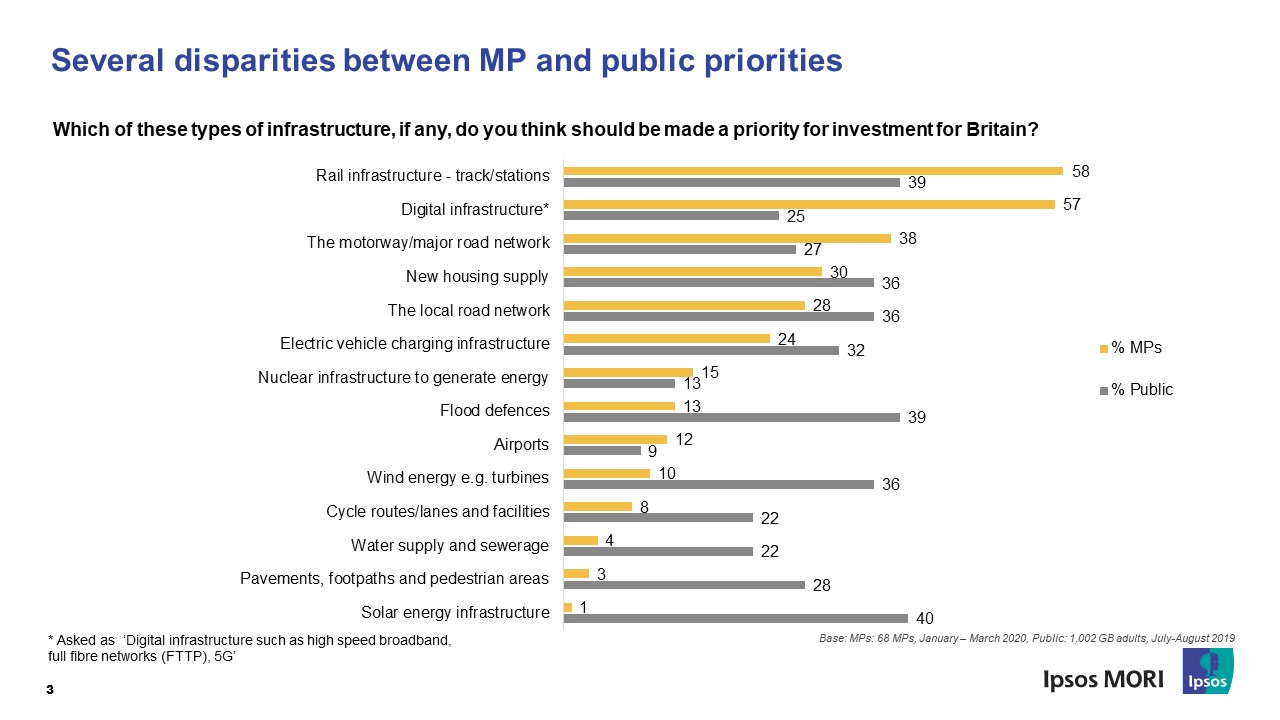“Build, build, build”: MPs back investment in infrastructure, but have different priorities
Different priorities
Rail infrastructure - track and stations - and digital infrastructure in the form of high speed broadband, full fibre networks and 5G, are top of MP’s infrastructure investment wish list according to a survey by Ipsos.
58% and 57% of MPs prioritise investment in rail and digital infrastructure respectively, choosing these from a list of 14. The Strategic Road Network – motorways and major roads – and housing supply come third and fourth, selected by 38% and 30%. Renewable energy infrastructure – wind and solar – are chosen by just 10% and 1% of MPs.

The survey among 68 MPs, undertaken between January and March 2020, found their priorities differ markedly from the public’s as measured in the fourth Global Infrastructure Index conducted in August 2019. Then, 40% of Britons selected solar energy infrastructure as an investment priority, followed by flood defences and rail (both 39%). MPs prioritise digital infrastructure relatively more highly than the public (57% compared to 25%), as did Captains of Industry who made it their top priority in late 2018 (59% chose this).
Consensus and disagreement
Every MP we interviewed agreed that investing in infrastructure is vital to Britain's future economic growth while 80% of the British public share this sentiment. There is also a strong conviction that we are not doing enough to meet our infrastructure needs; 96% of MPs agree, as did 66% of the public last year.
MPs are relatively less satisfied with Britain’s infrastructure, a fifth (22%) rate it positively compared to just over a third (36%) of the public. Most MPs of all parties think Britain has a poor record of getting national infrastructure projects right; 85% compared to 53% among the public.
While three-quarters of MPs (73%) are ‘fine’ with foreign investment in infrastructure in Britain, it’s 48% among the public. MPs are even more comfortable with private sector investment on the condition that it means Britain gets the infrastructure it needs – 91% compared to 48% of the public.
MPs are also less minded to think that we should prioritise maintaining and repairing existing infrastructure before spending on new infrastructure; 30% take this view compared to 58% of the public.
Commenting on the findings, Ben Marshall, Research Director for Transport and Infrastructure at Ipsos, said:
The Prime Minister recently restated the ‘infrastructure revolution’ and pledged to “build, build, build”, and these findings show broad consensus across the House of Commons for improvement and investment in infrastructure.
MPs’ top priorities are rail and digital infrastructure. However, they ought to be mindful that they are more enamoured with new infrastructure than the public who are also much more likely to prioritise ‘green’ investments. Our elected representatives are also relatively more comfortable with both private and foreign investment than those they represent.
We don’t yet know whether Coronavirus has changed perspectives and priorities in Westminster and across the country. What won’t change is that, to be successful, “build, build, build” and improving infrastructure requires good politics, good communication and engagement, as well as first rate engineering and construction.
Technical Note
Findings come from Ipsos’s twice-yearly survey of MPs:
- The survey took place face-to-face with 68 MPs from 6 January – 5 March 2020.
- We apply quotas and weight results by political party to reflect the political makeup of the House of Commons following the 2019 General Election.
Findings relating to the general public come from the annual Global Infrastructure Index (conducted in partnership with the Global Infrastructure Investors Association):
- Ipsos surveyed 1,002 British adults online between 26 July – 9 August 2019.
- Data is weighted.
- Details are here: Global Infrastructure Index - Public satisfaction and priorities 2019



